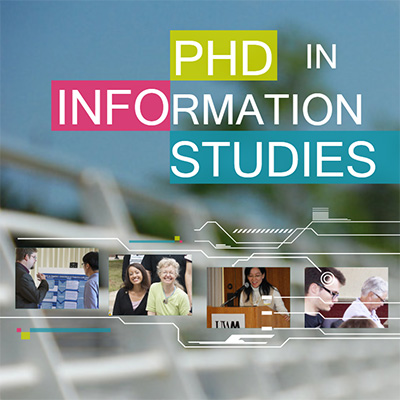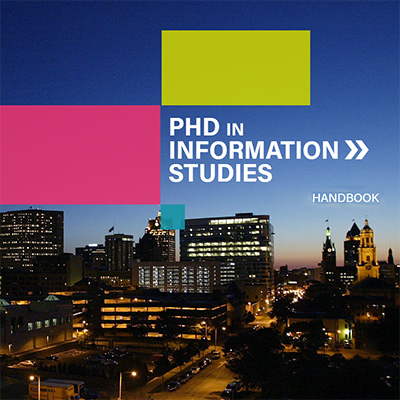Information Studies, PhD PHD
The information science PhD program is preparing the next generation of information scientists for academic and professional careers where an in-depth knowledge of research processes and evaluation is needed.
Program Type
Doctoral
Program Format
Hybrid, On Campus, Online
A Research Environment – Vibrant and Diverse
- UW-Milwaukee is an R1 university – one of the nation’s top research universities as recognized by the Carnegie Classification of Institutions of Higher Education.
- The School of Information Studies (SOIS) ranks fourth internationally and second in the U.S./Canada in department contributions to library and information science (LIS) literature as reported in a study by Walters & Wilder (2015). Journal of the Association for Information Science and Technology
- SOIS Faculty rank 10th in Productivity of U.S. LIS and iSchool faculty. by John M. Budd, “Productivity of U.S. and iSchool faculty,” October 2015, in Library & Information Science Research

The PhD program at SOIS establishes a dynamic, inclusive, and supportive intellectual environment from a combination of advising, mentoring and involvement in research projects with faculty.
The information science PhD program emphasizes the study of the representation, storage, retrieval, use and impact of information resources on society.
Graduates will contribute to the knowledge base of the discipline and will take on leadership roles as scholars and administrators in the discipline and the profession.
The Doctor of Philosophy in Information Studies is a STEM-designated program with Optional Practical Training (OPT) eligibility.
Ph.D. Alumni Placements
Our program prepares the next generation of information science scholars.
Recent graduates of the information science PhD program have joined the faculty of leading universities in the U.S. and abroad. Others join work in leading research positions in industry, academia, and private organizations.
Ph.D. Dissertations
Program Information
Doctoral Program Coursework
Information science PhD students will need to complete a minimum of 30 credits of approved coursework at the 700-level or higher.
- Foundation Courses in Information Studies (12 credits)
- Research Methods and Design (9 credits)
- Specialized area (9 credits)
- Sample PhD Course Plan – Please note this course plan is TENTATIVE and subject to change without notice.
The complete list of SOIS courses can be found in the UW-Milwaukee Academic Catalog.
Preliminary Examinations / Preparatory Essays
Dissertation Proposal
Dissertation
Dissertation Defense
PhD Program Details
Please visit the UW-Milwaukee, Academic Catalog for complete program details:
https://catalog.uwm.edu/community-engagement-professions/information-studies/information-studies-phd/
For information on policies and procedures for doctoral students, please see the UW-Milwaukee, Graduate Policies website.
Full-time onsite information science PhD students are eligible for teaching assistantships. Typical appointments are 33% (13 hours per week) and 9-month appointments. Assistants receive bi-weekly pay, tuition remission, and health insurance coverage based on the Graduate School Schedule.
Financial Aid, Scholarships, Assistantships & Awards
SOIS offers several funding opportunities for its PhD students based on the availability of funding. Funding opportunities can include: travel funding for conference presentations, research support to assist with costs associated with dissertation research, and adjunct teaching opportunities to support their studies.
UWM Graduate School Financial Support Resources
The UWM Graduate School provides competitive scholarships such as Graduate School Fellowships, Doctoral Dissertation Fellowships, Advanced Opportunity Fellowships, Graduate Student Travel Awards and Golda Meir Library Scholar Awards. For more information on the types of funding available, please visit the UWM Graduate School website: uwm.edu/graduateschool/types-of-funding/
Cost of Attendance
UWM Onsite Tuition and Fee Information
(Including dissertator fees)
Tuition is determined by the UW System Board of Regents, in the summer preceding each academic year. More information is available on the UW System website.
SOIS Online Fees
The 2022-23 academic year tuition for one online 3-credit graduate course in the School of Information Studies will cost $2,400 ($800/per credit). This amount is assessed for all online courses regardless of your geographic location. This tuition is assessed in lieu of standard UW System resident/non-resident tuition and campus-segregated fees.
How is this fee determined?
The University of Wisconsin System online course regulations determine how this fee is structured. This amount is calculated by adding the off-campus tuition for one credit to SOIS’ online fee. Over the past five years, SOIS has held the increase of this fee to under the percentage applied to general tuition by the Board of Regents.
Students begin the Information Science PhD program in the fall. All application materials, as outlined in the application checklist below, must be received by Jan. 10. An applicant whose file is incomplete will not be eligible for review. Application requirements are the same for traditional and distance students.
An applicant must meet Graduate School requirements plus the departmental requirements to be considered for admission to the program in regular status.
Graduate School Application Checklist
For complete details on Graduate School Admission Requirements, please visit:
uwm.edu/graduateschool/admission/
School of Information Studies Application Checklist
An applicant must meet Graduate School requirements plus these departmental requirements to be considered for admission to the program in regular status:
- Have a cumulative GPA in coursework for the master’s degree of at least 3.5 and an undergraduate GPA of 3.0. Applicants possessing a Master of Library and Information Science, or a master’s degree in an allied discipline, are encouraged to apply.
- Submit verbal and quantitative scores for the Graduate Record Examination (GRE) taken within the past five years. Please note: GRE is recommended but not required for the fall 2024 SOIS admission cycle.
- Submit three letters of recommendation from qualified persons who can attest to the applicant’s aptitude for doctoral study. At least one letter must be from an academic.
- Submit a writing sample that demonstrates the applicant’s analytical and critical thinking skills. This may take the form of a published research paper, a term paper from a previous graduate program or an earlier completed thesis.
- Applicants are encouraged to bring at least two years of relevant professional experience prior to entering the PhD program.
Applicants lacking the requisite GPA or academic area may be considered for admission on probation and may be required to complete preparatory coursework.
The PhD Distance Option provides an additional mode of research and study that eliminates some of the barriers associated with the traditional method of pursuing an advanced research degree.
Distance Students Encourage To Apply!
Distance students (not located near Milwaukee, Wisconsin) are encouraged to apply. Such students will be required to attend a one- to two-day orientation on campus at the beginning of the program and be physically present for all major program milestones, including preliminary exam defense, dissertation proposal defense and formal defense of the dissertation. SOIS doctoral seminars will be streamed live online for distance students to participate synchronously with local students and faculty, and students will be responsible for meeting all other program requirements via online courses or other approved means.
Students begin the Information Studies doctoral program in the fall. An applicant whose file is incomplete will be asked to contact the Graduate School. Application requirements are the same for traditional and distance students. Distance students must also meet the UWM Graduate School residency requirements; physical residency in Milwaukee is not necessary.
Note: PhD students enrolled in the Distance Option are self-funded. There is no financial support provided by the School of Information Studies for this program option.
Internet Connection:
Required: Broadband Internet Connection with 5Mbps download and 5Mbps upload and a home network to reliably support these speeds
Highly Suggested: 15Mbps download and 5Mbps upload
Computer:
Required: Intel i5 CPU 8GB RAM 160GB HDD
Highly Suggested: Intel i5 CPU 16GB RAM 250GB SSD
Computer Accessories Requirements:
Monitor capable of displaying 1920×1080 or higher Webcam capable of 1080p resolution (Suggestion: Logitech C920) Microphone (Suggestions: Rode Procaster, Blue Yeti, Shure SM58) Quality Headphones (Suggestions: Shure SRH440, Sennheiser HD 280 PRO)
Operating System:
Windows 10 (preferred), MacOS Sierra
Physical Environment:
A comfortable and quiet environment that is free from environmental noises (kids, traffic, etc.) and provides good lighting so that the class can see the distance student and hear them without interference.


